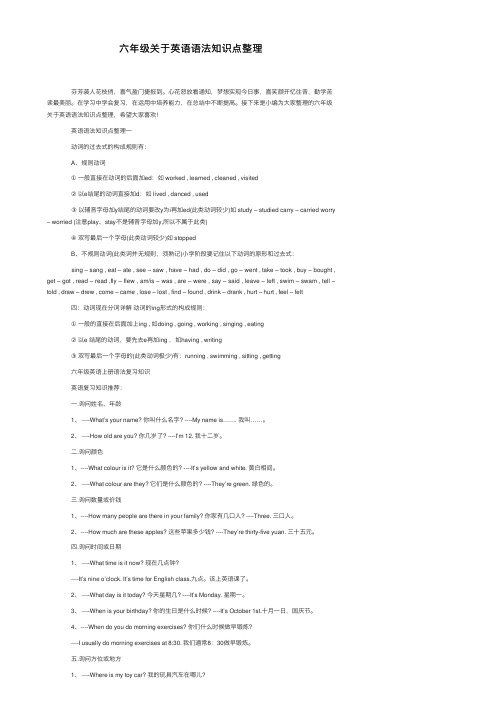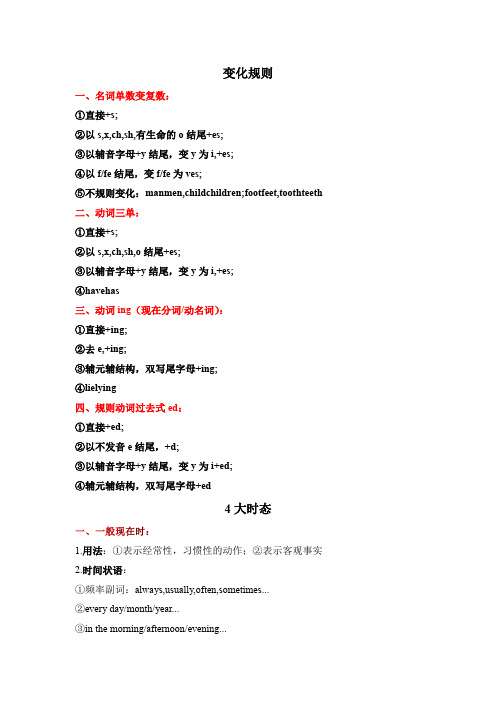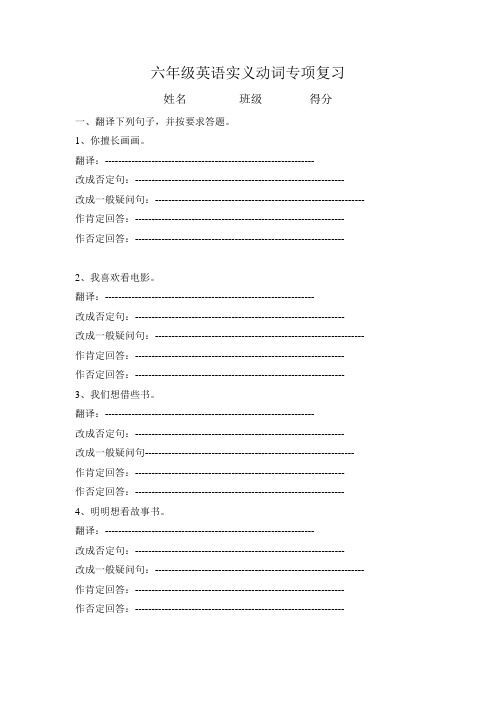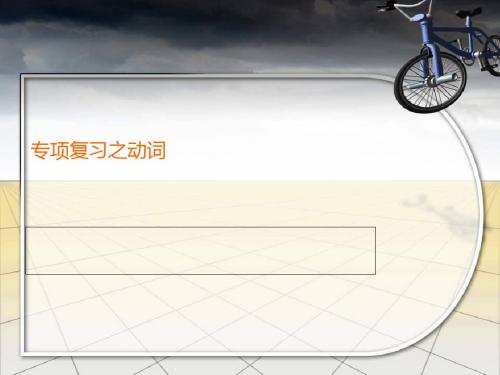六年级英语动词的形式复习
六年级关于英语语法知识点整理

六年级关于英语语法知识点整理 芬芳袭⼈花枝俏,喜⽓盈门捷报到。
⼼花怒放看通知,梦想实现今⽇事,喜笑颜开忆往昔,勤学苦读最美丽。
在学习中学会复习,在运⽤中培养能⼒,在总结中不断提⾼。
接下来是⼩编为⼤家整理的六年级关于英语语法知识点整理,希望⼤家喜欢! 英语语法知识点整理⼀ 动词的过去式的构成规则有: A、规则动词 ①⼀般直接在动词的后⾯加ed:如 worked , learned , cleaned , visited ②以e结尾的动词直接加d:如 lived , danced , used ③以辅⾳字母加y结尾的动词要改y为i再加ed(此类动词较少)如 study – studied carry – carried worry – worried (注意play、stay不是辅⾳字母加y,所以不属于此类) ④双写最后⼀个字母(此类动词较少)如 stopped B、不规则动词(此类词并⽆规则,须熟记)⼩学阶段要记住以下动词的原形和过去式: sing – sang , eat – ate , see – saw , have – had , do – did , go – went , take – took , buy – bought , get – got , read – read ,fly – flew , am/is – was , are – were , say – said , leave – left , swim – swam , tell –told , draw – drew , come – came , lose – lost , find – found , drink – drank , hurt – hurt , feel – felt 四:动词现在分词详解动词的ing形式的构成规则: ①⼀般的直接在后⾯加上ing , 如doing , going , working , singing , eating ②以e 结尾的动词,要先去e再加ing ,如having , writing ③双写最后⼀个字母的(此类动词极少)有:running , swimming , sitting , getting 六年级英语上册语法复习知识 英语复习知识推荐: ⼀.询问姓名、年龄 1、 ----What’s your name? 你叫什么名字? ----My name is……. 我叫……。
新标准英语六年级下册专题复习——动词的第三人称单数、现在分词、过去式变化规则及发音规则

新标准英语六年级下册专题复习——动词的第三人称单数、现在分词、过去式变化规则及发音规则(后附:清浊辅音、开闭音节、可数名词复数变化规则)动词的第三人称单数及发音规则:1. 一般直接在词尾加-s,-s在清辅音后读/s/,在浊辅音或元音后读/z/, ds读/dz/, ts读/ts如help helps/s/ know knows/z/ get gets/s/ read reads/z/2. 以字母s, x, ch, sh或有些以o 结尾的动词加-es,-es 读/iz/如guess guesses fix fixes teach teaches wash washes 注意:go goes/z/ do does /z/3. 辅音字母+y结尾的动词,先变y为i,再加-es,-ies读/iz/如carry carries fly flies注意:在play---plays,say----says中,字母y前为元音字母,第三人称单数形式直接在动词后加-s4. be动词的第三人称单数分别为am, is,(are是you你的单数), have则为has注意:以不发音字母“e”结尾的开音节词,如果尾音是/s/,/z/,加-s后,字母”e”发音,与所加-s一起读作/iz/,如close closes/iz/动词的现在分词(动词的ing形式)变化规则:1. 一般情况直接加ing,如look—looking go---going visit---visiting2. 以不发音的e结尾的,去e再加ing,如come---coming make---making write---writing3. 以重读闭音节结尾并且只有一个辅音字母的,双写该辅音字母,再加ing如run---running stop---stopping get---getting swim---swimming begin---beginning4. 以辅音字母加y结尾的,直接加ing,如study---studying carry---carryingfly---flying cry---crying5. 以ie结尾的重度开音节动词,先变ie为y,再加ing,如die---dying tie---tyinglie---lying 动词的过去式变化规则:1. 规则变化(1)一般直接在动词后加ed,-ed在清辅音后读/t/, 在浊辅音及元音后读/d,/-ed在/t//d/后读/id/如call---called open---opened look---looked want---wanted /id/ need---needed /id/ (2)以不发音的“e”结尾的,直接加-d ,如live---lived move---moved hope---hoped (3)以辅音字母加y结尾的动词,先变y为i,再加-ed,如study---studied cry---criedtry---tried 注意:如果是元音字母加y结尾的,还是直接加-ed,如,play---played,enjoy---enjoyed(4)以一个辅音字母结尾的重读闭音节动词,双写最后一个辅音字母,再加-ed 如plan---planned fit---fitted stop---stopped2. 不规则变化(要特殊记忆)。
专项复习动词单三形式的用法(课件)人教PEP版英语六年级下册

不遵循规则变化的动词: 有一些动词的变化并不遵循上述规则,需要特别注意。例如: have(有)→ has(有,第三人称单数) be(是/在)→ is(是/在,第三人称单数)
I often read books at home on the weekend. He often reads books at home on the weekend.
如:She goes home at fiveevery day. (变疑问句)就变换为: Does she go home at five every day 肯定回答-- Yes,she does. 否定回答:No,shedoesn’t.
常见错误及避免方法:
忽略动词变化: 错误:He go to school every day. 正确:He goes to school every day. 误用“-s”结尾的动词: 错误:She enjoyes swimming. 正确:She enjoys
基础上加上“-es”。
例如:fix(修复)→ fixes(修复,第三人称单数)
动词第三人称单数的变化规则
以辅音+y结尾的动词: 如果动词以辅音+y结尾,将“y”变为“i”,再加上“-es”。 例如:study(学习)→ studies(学习,第三人称单数) 以元音+y结尾的动词: 如果动词以元音+y结尾,直接加上“-s”。 例如:play(玩耍)→ plays(玩耍,第三人称单数)
第三人称单数: he, she, it, 单数人名
动词第三人称单数的变化规则
一般情况下的动词变化:
对于大多数动词,只需要在原形的基础上加上“-s”即可。
变化规则4大时态动词形式总结(知识清单)译林版英语六年级上册

变化规则一、名词单数变复数:①直接+s;②以s,x,ch,sh,有生命的o结尾+es;③以辅音字母+y结尾,变y为i,+es;④以f/fe结尾,变f/fe为ves;⑤不规则变化:manmen,childchildren;footfeet,toothteeth 二、动词三单:①直接+s;②以s,x,ch,sh,o结尾+es;③以辅音字母+y结尾,变y为i,+es;④havehas三、动词ing(现在分词/动名词):①直接+ing;②去e,+ing;③辅元辅结构,双写尾字母+ing;④lielying四、规则动词过去式ed:①直接+ed;②以不发音e结尾,+d;③以辅音字母+y结尾,变y为i+ed;④辅元辅结构,双写尾字母+ed4大时态1.用法:①表示经常性,习惯性的动作;②表示客观事实2.时间状语:①频率副词:always,usually,often,sometimes...②every day/month/year...③in the morning/afternoon/evening...3.动词三单的变化规则:①直接+s;②以s,x,ch,sh,o结尾+es;③以辅音字母+y结尾,变y为i,+es;④havehaseg.She often gets up at six in the morning.1.用法:表示现在正在发生的动作(be+动词ing)2.时间状语:①now,at the moment...②Look! Listen!..③It’s ..o’clock.(Don’t talk.Where’s ...?)...3.动词现在分词的变化规则:①直接+ing;②去e+ing;③辅元辅结构,双写尾字母+ing;④lielyingeg.She is watching TV now.1.用法:①表示过去发生的动作;②表示过去存在的状态;③表示过去经常反复发生的动作;④表示已故的人所做的事情;2.时间状语:①...ago(two days ago;long long ago...)②last...(last year;last night...)③介词+时间名词(in 1999...)④yesterday;just now;then(那时...3.规则动词过去式的变化规则:①直接+ed;②以不发音的e结尾,直接+d;③以辅音字母+y结尾,变y为i,+ed;④辅元辅结构,双写尾字母+edeg.I saw a film last night.四、一般将来时:1.用法:①表示将来会发生的动作;②表示将来会存在的状态;2.构型:be going to do sth. / will+动词原形3.时间状语:①tomorrow及相关短语;②next..(next year/month/week..)eg.I am going to watch a film tomorrow.动词适当形式总结①在一般现在时里,主语不是三单,则用动词原形;②情态动词can,should,must+动词原形;③助动词Do/Does/Did... don’t/doesn’t/didn’t+动词原形④let sb. do sth. help sb. do sth.2.动词三单在一般现在时里,主语是三单,则动词用三单形式3.动词ing①现在进行时的构型:be+动词ing②go,like,be+动词ing;be good at/before/about/for(等介词)...+动词ing4.动词不定式(to do sth)①want/would like to do sth②what/how/which+to do sth③be+形容词(happy/sorry/nice...) to do sth④ask sb to do sth, use/reuse sth. to do sth。
六年级英语语法毕业复习知识点

六年级英语语法毕业复习知识点六年级英语语法毕业复习知识点一一、词类动词、名词和形容词不太容易区分,如不能一眼看出,可用如下方法:先用“一(量词)”(如:一个、一张等)和这个词连起来说,如说得通,一般认为是名词;说不通再用“很”去判断,就是把“很”和为个词连起来说,说得通一般就是形容词;都说不通就是动词。
(目前我们学过的,以后可能不同)(另外一些很明显的,如人称代词、数词、情态动词等一下就可以知道)1、动词这里所说的动词是指各种动词总称,其中包括行为动词(就是我们平时总说的那种动词)、be动词、情态动词。
(1)行为动词就是我们平时上课时说的动词,表示某一动作或行为。
如:sweep、live等。
行为动词我们已学过它们的四种形式:原形、+s/es、+ed、+ing,具体判断方法如下:↗有,就加ing读句子→读该单词→认识该单词→理解意思→看有无be动词 (若是be going to 就用原形)↘没有,再看情态动词↗有,就用原形↗有,就加ed↘没有,再看有无表示过去的时间状语↗是第三人称单数就加s或es ↘没有,再看主语↘不是第三人称单数就用原形(2)be动词a、Am--was Is --was Are--were 口诀:我用am, 你用are, is用在他她它,所有复数全用are。
b、肯定和否定句 I am (not) from London. He is(not) a teacher. She is(not) in the dining room. My hairis(not) long. Her eyes are(not) small.c、一般疑问句 Am I a Chinese? Yes, you are. No, you aren’t. Are they American? Yes, they are. No, they aren’t. Is the cat fat? Yes, it is. No, itisn’t. 我们现在学过的be动词大致分两类:is、am、are为一类,一般用于一般现在时、现在进行时和一般将来时中,was和were为另一类,一般用于一般过去时。
六年级英语实义动词专项复习(湘少版)

六年级英语实义动词专项复习姓名班级得分一、翻译下列句子,并按要求答题。
1、你擅长画画。
翻译:---------------------------------------------------------------改成否定句:---------------------------------------------------------------改成一般疑问句:--------------------------------------------------------------- 作肯定回答:---------------------------------------------------------------作否定回答:---------------------------------------------------------------2、我喜欢看电影。
翻译:---------------------------------------------------------------改成否定句:---------------------------------------------------------------改成一般疑问句:--------------------------------------------------------------- 作肯定回答:---------------------------------------------------------------作否定回答:---------------------------------------------------------------3、我们想借些书。
翻译:---------------------------------------------------------------改成否定句:---------------------------------------------------------------改成一般疑问句--------------------------------------------------------------- 作肯定回答:---------------------------------------------------------------作否定回答:---------------------------------------------------------------4、明明想看故事书。
六年级be动词知识点总结

六年级be动词知识点总结be动词是英语中最基础也是最常用的动词之一,它在句子中充当了谓语,用来描述或表示主语的状态、特征、身份等。
在六年级学习英语的过程中,我们已经接触了be动词的各种形式和用法。
下面就是对be动词知识点的总结。
一、be动词的形式be动词有三种形式,分别是am、is、are。
其中,am用于第一人称单数(I),is用于第三人称单数(he、she、it),are用于第一、二、三人称复数(we、you、they)。
例如:- I am a student.(我是一个学生。
)- She is tall and beautiful.(她又高又漂亮。
)- We are good friends.(我们是好朋友。
)二、be动词的用法1. 表示身份、国籍、职业等Be动词可以用来表示人或物的身份、国籍、职业等。
例如:- He is a doctor.(他是一名医生。
)- They are from Japan.(他们来自日本。
)2. 表示性格特征Be动词还可以用来描述人或物的性格、特点等。
例如:- My sister is kind and friendly.(我妹妹很友善。
)- The cat is cute.(这只猫很可爱。
)3. 表示时间、地点等Be动词也可以用来表示时间、地点等。
例如:- It is ten o'clock.(现在是十点钟。
)- The park is near my house.(这个公园离我家很近。
)4. 表示感受、状态等Be动词还可以表示人或物的感觉、状态等。
例如:- We are happy to see you.(见到你我们很高兴。
)- The dog is sleeping.(这只狗正在睡觉。
)三、be动词的否定形式be动词的否定形式是在be动词后面加not。
例如:- He is not my brother.(他不是我的兄弟。
)- They are not at home.(他们不在家。
六年级英语动词专项复习高品质版

动词-过去式
• ①规则动词词尾加ed的读音 • (1)在清辅音后读作[t]。如:asked, helped, watched,
stopped (2)在浊辅音和元音后读作[d]如:enjoyed, studied, moved,(3) 在t / d后读作[id]。如:wanted, needed
随着年岁的叠加,我们会渐渐发现:越是有智慧的人,越是谦虚,因为昂头的只是稗子,低头的才是稻子;越是富有的人,越是高贵,因为真正的富裕是灵魂上的高贵以 及精神世界的富足;越是优秀的人,越是努力,因为优秀从来不是与生俱来,从来不是一蹴而就。随着沧桑的累积,我们也会慢慢懂得:成功的路,其实并不拥挤,因为 能够坚持到底的人实在太少;所有优秀的人,其实就是活得很努力的人,所谓的胜利,其实最后就是自身价值观的胜利。人到中年,突然间醒悟许多,总算明白:人生, 只有将世间的路一一走遍,才能到尽头;生活,只有将尘世况味种种尝遍,才能熬出头。这世间,从来没有最好,只有更好。每天,总想要努力醒得比太阳还早,因为总 觉得世间万物,太阳是最能赐人力量和能量的。每当面对喷薄的日出,心中的太阳随之冉冉腾起,生命之火熊熊燃烧,生活的热情就会光芒四射。我真的难以想象,那些 从来不早起的人,一生到底能够看到几回日升?那些从来没有良好习惯的人,活到最后到底该是多么的遗憾与愧疚?曾国藩说:早晨不起,误一天的事;幼时不学,误一 生的事。尼采也说:每一个不曾起舞的日子,都是对生命的辜负。光阴易逝,岂容我待?越是努力的人,越是没有时间抱怨,越是没有工夫颓丧。每当走在黎明的曙光里, 看到那些兢兢业业清洁城市的“美容师”,我就会由衷地欣赏并在心底赞叹他们,因为他们活得很努力很认真。每当看见那些奔跑在朝霞绚烂里的晨练者,我就会从心里 为他们竖起大拇指,因为他们给自己力量的同时,也赠予他人能量。我总觉得:你可以不优秀,但你必须有认真的态度;你可以不成功,但你必须努力。这个世界上,从 来没有谁比谁更优秀,只有谁比谁更努力。我也始终认为:一个活得很努力的人,自带光芒万丈;一个人认真的样子,比任何时候都要美好;一个能够自律自控的人,他 的人生也就成功了大半。世间每一种的好,从来都只为懂得努力的人盛装而来。有时候,我真的感觉,人生的另一个名字应该叫做努力,努力了就会无悔,努力了就会无 愧;生活的另一种说法应该叫做煎熬,熬过了漫漫黑夜,天就亮了,熬过了萧萧冬日,春天就来了。人生不易,越努力越幸运;余生不长,越珍惜越精彩。人生,是一本 太仓促的书,越认真越深刻;生命,是一条无名的河,越往前越深邃。愿你不要为已逝的年华叹息,不要为前路的茫茫而裹足不前愿你相信所有的坚持总能奏响黎明的号 角,所有的努力总能孕育硕果的盛驾光临。愿你坚信越是成功的人越是不允许自己颓废散漫,越是优秀的人越是努力……生活中很多时候,我们遇到一些复杂的情况,会 很容易被眼前的障碍所蒙蔽,找不到解决问题的方法。这时候,如果能从当前的环境脱离出来,从一个新角度去解决问题,也许就会柳暗花明。一个土豪,每次出门都担 心家中被盗,想买只狼狗栓门前护院,但又不想雇人喂狗浪费银两。苦思良久后终得一法:每次出门前把WiFi修改成无密码,然后放心出门每次回来都能看到十几个人捧 着手机蹲在自家门口,从此无忧。护院,未必一定要养狗换个角度想问题,结果大不同。一位大爷到菜市场买菜,挑了3个西红柿到到秤盘,摊主秤了下:“一斤半3块 7。”大爷:“做汤不用那么多。”去掉了最大的西红柿。摊主:“一斤二两,3块。”正当身边人想提醒大爷注意秤时,大爷从容的掏出了七毛钱,拿起刚刚去掉的那个大 的西红柿,潇洒地换种算法,独辟蹊径,你会发现解决问题的另一个方法。生活中,我们特别容易陷入非A即B的思维死角,但其实,遭遇两难困境时换个角度思考,也许 就会明白:路的旁边还有路。一个鱼塘新开张,钓费100块。钓了一整天没钓到鱼,老板说凡是没钓到的就送一只鸡。很多人都去了,回来的时候每人拎着一只鸡,大家 都很高兴!觉得老板很够意思。后来,钓鱼场看门大爷告诉大家,老板本来就是个养鸡专业户,这鱼塘本来就没鱼。巧妙的去库存,还让顾客心甘情愿买单。新时代,做 营销,必须打破传统思维。孩子不愿意做爸爸留的课外作业,于是爸爸灵机一动说:儿子,我来做作业,你来检查如何?孩子高兴的答应了,并且把爸爸的“作业”认真 的检查了一遍,还列出算式给爸爸讲解了一遍不过他可能怎么也不明白为什么爸爸所有作业都做错了。巧妙转换角色,后退一步,有时候是另一种前进。一个博士群里有 人提问:一滴水从很高很高的地方自由落体下来,砸到人会不会砸伤?或砸死?群里一下就热闹起来,各种公式,各种假设,各种阻力,重力,加速度的计算,足足讨论 了近一个小时 后来,一个不小心进错群的人默默问了一句:你们没有淋过雨吗 人们常常容易被日常思维所禁锢,而忘却了最简单也是最直接的路有两个年轻人,大学毕
